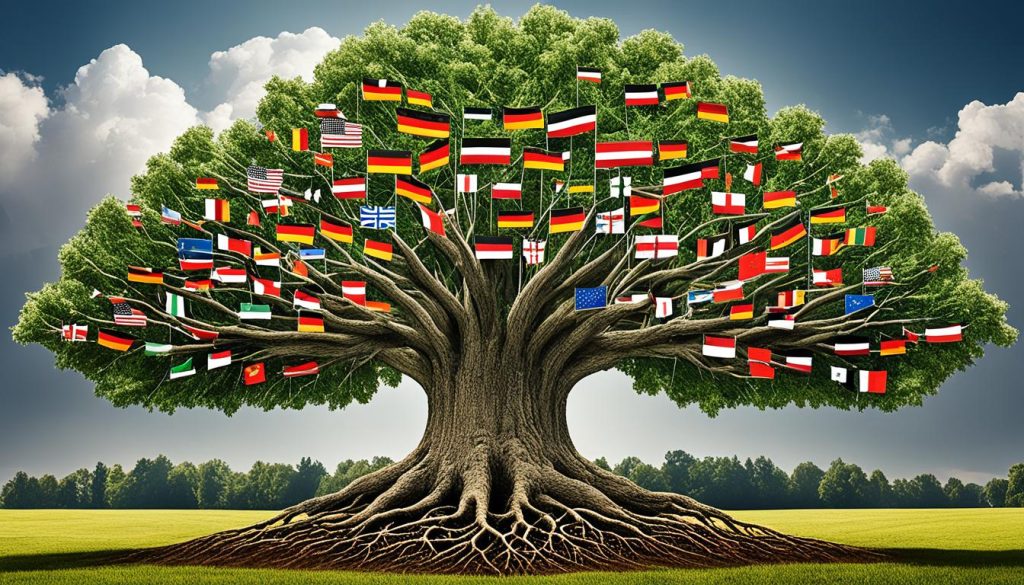German companies are now looking to grow globally. Known for their quality, innovation, and efficiency, they’re ready to face international competition and discover new markets.
They’re stepping beyond their national borders, creating detailed plans for going international. The aim is to be more competitive and achieve steady growth worldwide.
German firms mix market research, strategic planning, and smart investments to expand globally. They study new markets, spot chances for growth, and adjust their products to meet the needs of people around the world.
These companies also know it’s essential to navigate cultural and language differences in new markets. They focus on cross-cultural training and learning languages to communicate effectively and blend into local business scenes.
Technology is key in helping German businesses grow across the globe. By using the latest digital innovations, they make their operations smoother, more efficient, and competitive internationally. They use everything from e-commerce to supply chain solutions to boost their global image.
This article section will look into how German businesses plan to grow globally, the obstacles they encounter, and upcoming opportunities. By looking at success stories, partnerships, and government aid, we’ll uncover insights into German companies’ future global expansions.
Key Takeaways:
- German enterprises are focusing on global expansion to enhance competitiveness.
- Comprehensive strategies encompass market research, strategic planning, and targeted investments.
- Overcoming cultural and language barriers is crucial for successful internationalization.
- Technology plays a vital role in streamlining operations and improving efficiency.
- Successful case studies and collaborations provide valuable insights for future growth.
Understanding the Global Ambitions of German Enterprises
German companies are aiming to grow by reaching out to the world. They wish to explore international markets to gain a strong worldwide presence. This goal is central to their growth strategies.
They see a big chance outside their country. These firms plan to enter new markets for better profits and more market share. Going global helps them find new income sources, reducing their dependence on the home market.
Moving across borders allows them to meet more customers. They can serve people with different backgrounds and tastes. This move boosts their brand and makes them known internationally.
German businesses want to keep leading in the competitive market. They see the need to expand globally to stay ahead. This helps them follow global trends and new technologies.
It’s essential for these companies to grasp the uniqueness of new markets. They must understand cultural, economic, and legal differences. Knowing the market well ensures a successful start and operation.
German enterprises have what it takes to succeed globally. They are known for quality, innovation, and efficiency. This gives them an edge in many areas. By going global, they set themselves up as leaders worldwide.
Factors Driving Global Expansion for German Enterprises
German enterprises have been actively seeking global expansion for a while. This move is driven by key factors shaping their growth strategies. These factors include:
- Increased competition in domestic markets: With globalization, German enterprises are up against tough competition. They look for opportunities abroad to grow their customer base and diversify their revenue.
- Access to new customers and resources: Going global allows German businesses to reach more customers and increase their sales. They enter fast-growing markets, boosting their market share and profits. It also lets them access new resources like raw materials and talent.
- Need to diversify risk: By expanding globally, German companies spread their risk. This strategy lessens the impact of economic or political issues in any one market.
- Opportunity for innovation: Entereing new markets brings the chance to innovate and meet diverse customer needs. This keeps them competitive in the fast-changing global market.
- Access to new technologies and markets: Global expansion helps German enterprises find new technologies and market insights. This aids in innovation and strengthens their position both locally and worldwide.
With these factors in mind, German corporations craft strategies for global growth. Their aim is to achieve lasting success in international markets.
| Examples of German Enterprises’ Global Expansion | Countries of Expansion |
|---|---|
| BASF SE | United States, China, India |
| Volkswagen AG | United States, China, Brazil |
| Siemens AG | United States, China, India |
| Deutsche Bank AG | United States, United Kingdom, Singapore |
| SAP SE | United States, China, India |
Developing Effective Internationalization Strategies
German companies are determined to grow across the globe. They use various strategies to enter and succeed in new markets. This approach helps them make a significant impact.
Market Research
Conducting deep market research is vital. German companies spend lots of time and resources to understand their target markets. They learn about culture, economy, and laws to find opportunities and customize their offers.
Partnerships and Acquisitions
German firms also team up or buy businesses in their target countries. This way, they get to use local networks and knowledge. Such moves help them start smoothly, reach more customers, and use established channels.
Product and Service Adaptation
It’s crucial for German companies to adapt their offerings. They tweak their products to match local tastes and norms. This strategy increases satisfaction and gives them an edge abroad.
Strategic Alliances and Joint Ventures
Teaming up with local companies is another key method. It combines strengths and helps German companies enter new markets. Partnerships offer local knowledge, networks, and insights.
German firms need good strategies to grow internationally. Research, partnerships, adaptation, and alliances are their tools for success. With these approaches, they can tackle challenges and excel worldwide.
Overcoming Cultural and Language Barriers
German companies face issues when they grow globally, like cultural and language barriers. But, with the right approach, they can be overcome. This ensures successful international growth.
The Importance of Cultural Intelligence
Cultural differences in customs, traditions, and business methods can be barriers. German companies must focus on cultural intelligence. It helps understand and adapt to new cultures. Investing in cultural intelligence training helps employees learn to navigate new cultural environments. This builds strong relationships and a positive company image.
Language Training and Localization Strategies
Speaking the local language is crucial for global business. Language barriers can stop effective communication and market success. German companies offer language training to employees. This helps bridge the communication gap. Also, translating marketing content into the local language improves customer engagement and trust.
Cross-Cultural Collaboration and Partnerships
Working with local partners is very helpful for German companies. These partnerships provide valuable insights into the market. They help understand local culture. Such collaboration leads to sharing ideas and growth for both.
Embracing Diversity and Inclusion
A diverse and inclusive workplace is essential for overcoming cultural and language barriers. It brings various perspectives and ideas. This is key to solving problems and innovating. Diverse teams are better at understanding cultural differences.
German companies can succeed globally by tackling cultural and language challenges. Focusing on cultural intelligence, language skills, partnerships, and diversity sets them up for success. This way, they thrive in international markets.
Leveraging Technology for Global Growth
Technology is key to the global growth of German companies. By using technology, they reach new markets, improve their work, and connect with customers everywhere. This includes digital platforms, e-commerce, and innovative tech.
Embracing E-commerce for International Reach
German businesses see big potential in e-commerce for growing globally. They set up online shops to break geographical limits and reach more customers. E-commerce makes it easy for them to show what they offer and carry out smooth transactions.
They use secure payment systems and effective logistics to deliver worldwide. This helps their global growth.
Optimizing Operations with Innovative Technologies
German firms also use new technologies to better their operations and global status. They integrate analytics, AI, and automation to make their supply chains more efficient and give custom experiences to customers. With the help of data, they can make smart decisions, spot trends, and adjust their plans for each region.
Using tech solutions helps German businesses overcome language and cultural differences. Translation and localization tools allow them to clearly communicate with different regions. This way, they can connect well with international markets and grow globally in a sustainable manner.
| Benefits of Leveraging Technology for Global Growth |
|---|
| Expand into new ,arkets |
| Increase operational efficiency |
| Reach a broader customer base |
| Optimize supply chain processes |
| Deliver personalized customer experiences |
German enterprises greatly benefit from using technology for global growth. Embracing e-commerce, using new tech, and making their operations better help them unlock new chances, stay ahead of competition, and grow sustainably worldwide. Technology is both a tool for expansion and a force for transformation, making these businesses global leaders in their fields.
Case Studies: Successful Global Expansions by German Enterprises

In this section, we explore real-life stories of German companies growing globally. These case studies show the strategies, hurdles, and key lessons from their international journeys.
VW: Driving Global Success
Volkswagen (VW) is a standout German car maker known worldwide. It has grown through strategic deals and acquiring other companies. VW’s emphasis on new technologies and green initiatives has made it a top player in the electric car market.
Table: VW’s Global Expansion
| Year | Expansions |
|---|---|
| 2007 | Acquisition of Audi, SEAT, and Škoda |
| 2012 | Manufacturing plants set up in China |
| 2017 | Focus on self-driving car tech |
Bosch: Engineering Global Solutions
Bosch stands out as a global engineering and technology leader. It’s known for pushing boundaries in various sectors like automotive, industry solutions, and smart homes. Bosch’s drive for innovation has let it enter and thrive in many markets.
Table: Bosch’s Global Expansion
| Year | Expansions |
|---|---|
| 2001 | New manufacturing sites in China |
| 2010 | Buying a solar energy firm in the U.S. |
| 2018 | Entering AI and IoT areas |
These stories underline strategic thinking, studying markets, and understanding local norms. VW and Bosch’s international growths inspire other firms aiming to go global.
Ensuring Sustainable Growth in International Markets
For German enterprises looking to grow abroad, sustainable growth is key. This part talks about strategies and practices for German companies. These will help them succeed globally for a long time.
1. Ongoing Market Analysis
Understanding market dynamics is crucial for growth abroad. German companies need to keep an eye on market trends, consumer behavior, and competition. This helps them find new opportunities and adapt their strategies. Staying updated helps companies make smart decisions and lead globally.
2. Adaptability and Flexibility
Entering new markets means being adaptable and flexible. German companies should tailor their products, services, and marketing. This meets the needs of different cultures and regions. Embracing local differences and customizing offers helps build a strong international presence.
3. Responsible Business Practices
Adopting sustainable practices is crucial for the environment, society, and business growth. By being ethical, like reducing environmental impact and supporting communities, companies boost their image. This attracts consumers who care about society and gives companies an edge.
4. Building Strategic Partnerships
Working with local partners abroad can help German companies grow sustainably. These partnerships give access to local knowledge, networks, and customers. This makes entering new markets easier and strengthens the company’s position. By collaborating, German companies can grow faster in new territories.
5. Continuous Innovation
Innovation drives growth everywhere, including abroad. German companies should focus on improving their offerings constantly. Being ahead in technology and trends helps them stand out, capture opportunities, and maintain growth. Innovation is key for long-term success.
By following these strategies, German companies can grow sustainably abroad. Adapting, understanding markets, being responsible, partnering strategically, and innovating are essential. These will help German businesses flourish globally and stay ahead in international markets.
Global Competitiveness and the Role of German Enterprises
German enterprises are key to driving global competitiveness and setting industrial standards. They are known for their commitment to innovation, quality, and sustainability. This has made them important players on the international stage.
The Pioneers of Innovation
German companies lead with cutting-edge technologies and groundbreaking research. They always invest in research and development. This keeps them ahead in sectors like automotive, engineering, pharmaceuticals, and technology.
Quality as a Differentiating Factor
German companies are famous for their high quality. They focus on precision and craftsmanship. This makes their products and services stand out and earns trust worldwide.
Sustainable Practices for a Better Future
German companies focus on sustainable business. They believe in the benefits of eco-friendly initiatives. Through energy-efficient manufacturing and responsible supply chains, they promote a greener economy.
Global Expansion and Economic Growth
Expanding globally is key to the success of German enterprises. They enter new markets and build global presence, boosting growth at home and worldwide. Their skill in adjusting to diverse markets and international business landscapes is exceptional.
German Enterprises and Global Competitiveness
| Key Contributor | Description |
|---|---|
| Innovation | Constantly pushing the boundaries of technology and research |
| Quality | Uncompromising commitment to delivering products and services of the highest standards |
| Sustainability | Adoption of environmentally friendly practices for a greener future |
| Global Expansion | Establishing a strong presence in international markets to drive economic growth |
German enterprises excel by constantly pursuing excellence. Through innovation, quality, sustainability, and strategic growth, they become industry leaders.
Challenges Faced by German Enterprises in Global Expansion

German companies face many challenges when they go global. These include dealing with rules from other countries, understanding different cultures, and entering new markets.
Each country has its own laws, which can be very different from Germany’s. German companies must research and understand these laws well. This is essential to avoid breaking any laws.
Understanding different cultures is also important. Every country has its own way of doing business, based on its customs and traditions. Building good relationships and communicating well with people from these countries is key.
Market entry barriers
German companies also find market entry barriers tough. These barriers might be due to strong competition, established companies, and tough rules for entering the market. To overcome these, companies need a well-thought-out plan and a strategy tailor-made for each market.
Let’s take XYZ Kitchen Appliances Ltd. as an example. This German company makes household appliances and wanted to grow internationally. They found it tough in different ways in each new market.
In China, they faced tough rules about product safety and had to get many certifications. They also had to change some product designs to meet the preferences of Chinese customers.
They also had to change their marketing to fit cultural preferences. For example, cooking styles and kitchen designs vary greatly. So, they had to adapt their products and ads to suit local tastes.
This story shows how complex it can be for German companies to enter international markets. Yet, these challenges emphasize the need for detailed planning, flexibility, and a solid understanding of each market.
In short, German companies face many hurdles when going global. They must deal with different laws, cultures, and market entry challenges. With the right plans and knowledge of the markets, though, they can succeed and grow internationally.
Future Opportunities for German Enterprises in Global Markets
German enterprises have a golden chance to grow globally. With their strong skills, new ideas, and quality focus, they’re set to shine on the world stage.
In emerging markets, there’s a big demand for modern tech, quality products, and green solutions. German businesses, with their top-notch tech and engineering, can meet these needs.
Also, tech advancements open new doors for German companies. The digital world connects businesses with global customers. By using digital tools and technologies like AI, German companies can reach more customers worldwide.
Innovation and Collaboration
Working together with other companies also opens new opportunities globally. By making strategic partnerships, German businesses can enter new areas, gain resources, and share knowledge. This helps them grow and bring fresh ideas to life.
German enterprises can also stand out by offering eco-friendly products. With more people wanting sustainable goods, this is a chance to be different in the global market.
Key Success Factors
To win in global markets, understanding the market is key. German companies need to study market trends and customer wants. This helps them offer the right products.
Being flexible and innovative is crucial too. In a fast-changing world, German businesses need to keep up with new tech and trends to stay ahead.
Knowing about different cultures and local markets is very important. This knowledge helps German businesses build strong local partnerships and succeed worldwide.
German businesses have many opportunities as they go global. By focusing on new markets, using technology, and understanding cultures, they can become leaders in the world market.
Collaborations and Partnerships for Global Success
German enterprises value collaborations and partnerships highly. They form strategic alliances to get an edge in competition, enter new markets, and grow sustainably. These relationships are key for widening their global reach and spurring innovation.
Benefits of Collaborations and Partnerships
By working with others, German companies can join forces and become stronger together. This teamwork leads to better performance and a larger share of the market. They share knowledge and skills to tackle big challenges and bring new ideas to life.
Teaming up with local businesses abroad gives German companies insights into local ways and rules. Understanding these local aspects helps them overcome cultural and language barriers. This is crucial for their success in new countries.
Types of Collaborations and Partnerships
German companies use several ways to collaborate and partner up for global success:
- Strategic Alliances: They partner with others to reach common targets, like breaking into new markets. These partnerships can be formal or informal, based on shared interests.
- Joint Ventures: German firms join hands with partners for specific projects. This gives them access to local networks and customers.
- Industry Consortia: Companies work with industry peers to solve big issues together. This helps share knowledge, innovate, and make the industry more competitive.
Successful Examples
The partnership between BMW and Toyota to work on hybrid technology is a success story. It brought their expertise together, leading to new electric vehicle tech.
Siemens and Google’s collaboration to use AI in manufacturing is another highlight. It blends Siemens’ industrial knowhow with Google’s AI skills, boosting innovation.
Achieving Global Success through Collaboration
German companies know the importance of partnerships for international success. Together, they can face challenges, seize new chances, and lead in global markets.
Strategic collaborations help German firms grow internationally and become global leaders.
Government Support for German Enterprises’ Global Expansion

The German government plays a vital role in helping local businesses reach global markets. It provides support, initiatives, and policies aimed at promoting international growth. These efforts boost competitiveness, innovation, and sustainable development.
Financial help from the government comes as grants, loans, and subsidies. This support helps companies face the initial high costs of entering new markets, like market research and setting up distribution networks. With this help, businesses can focus more on expanding globally.
Additionally, the government works to open international markets for German firms. It does so by setting up trade agreements and lowering trade barriers. This creates a better environment for businesses to grow internationally. These efforts allow German companies to explore new markets and reach more consumers.
There’s also support from business development agencies that provide advice, networking, and market insights. They guide companies through the complexities of global trade. These agencies help businesses understand cultural, legal, and regulatory differences in new markets. With their support, German businesses can make smarter decisions and craft effective expansion strategies.
To promote expansion and innovation, the government invests in research and development. It funds research projects, encourages collaboration between universities and industry, and supports new technologies. This investment ensures that German businesses stay competitive globally.
The government shows strong commitment to helping German businesses expand globally. It provides financial support, helps with trade, offers business development services, and funds R&D. These actions support the national economy and empower German companies to grow internationally. By doing so, they also enhance Germany’s competitiveness.
The Future of German Enterprises’ Global Growth
The future looks bright for German companies going global. They’re known for top-notch quality, innovation, and efficiency. These qualities make them strong players on the world stage.
Digital transformation is key for their future success. As the globe gets more connected, German firms need to keep up with new trends and what customers want. Using things like artificial intelligence, data analytics, and automation will help them stay competitive and grow faster internationally.
However, this bright future comes with its challenges. The rapid pace of tech, global political changes, and shifting customer habits pose hurdles. German companies must stay flexible and innovative, investing in new ideas and continuously refining their strategies.
In summary, German enterprises’ growth globally will depend on their embrace of tech and adapting to complex markets. Leveraging their strengths, keeping up with changes, and responding to what consumers need are vital. Doing so will enable German firms to increase their international influence and contribute significantly to the world economy.
















